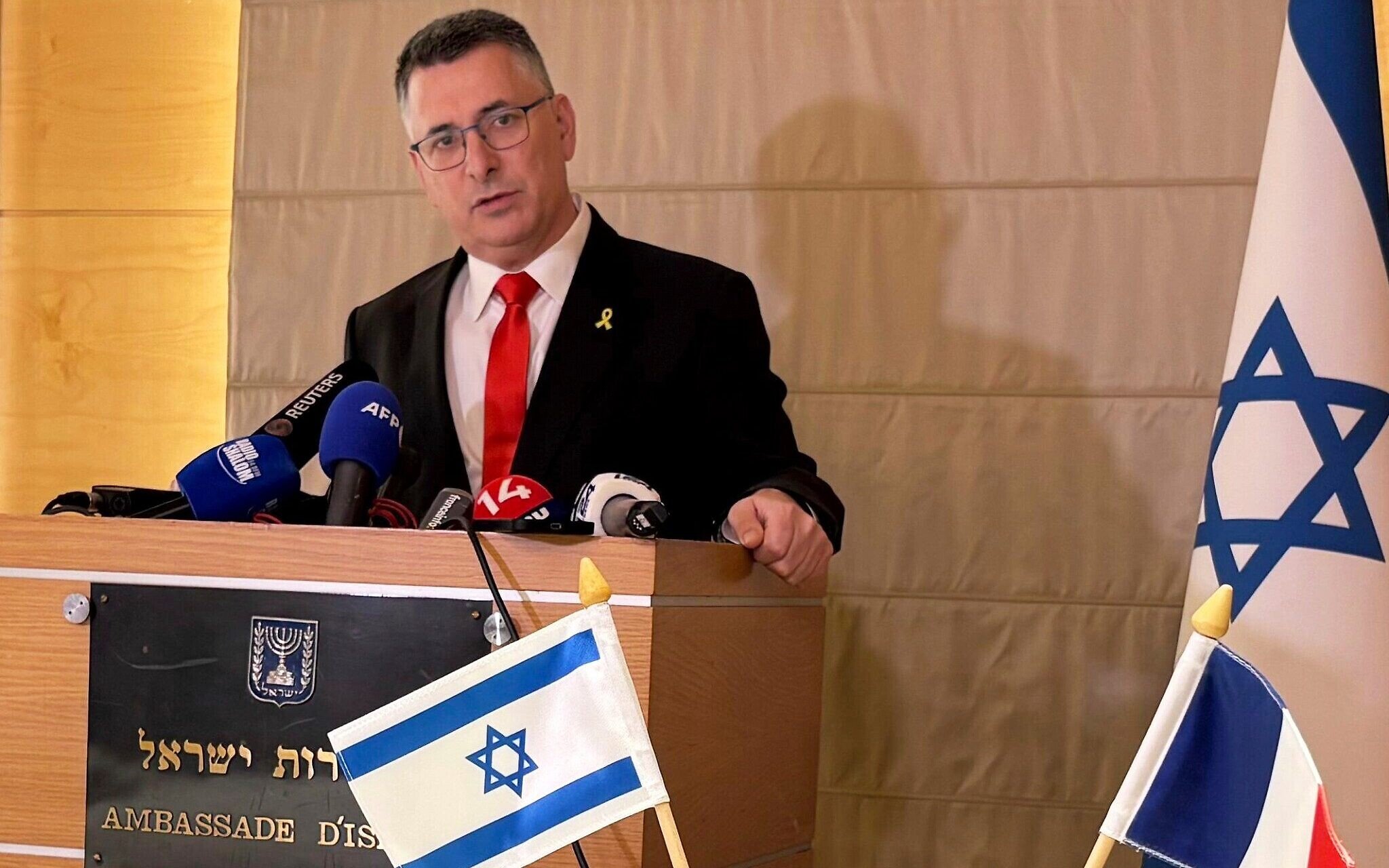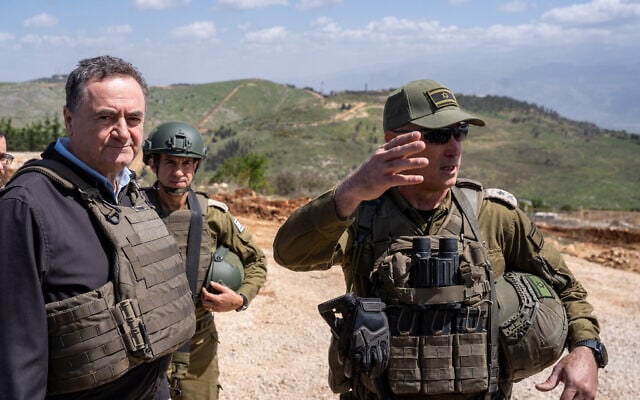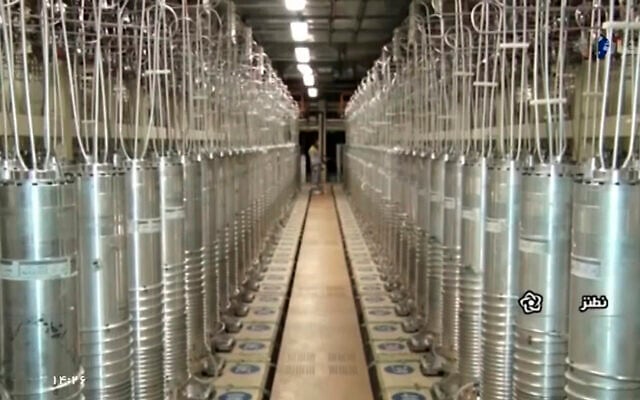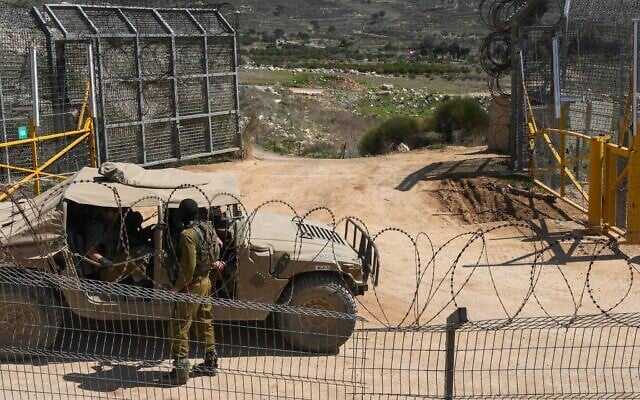



Israel is ready to end the war in Gaza “tomorrow” in exchange for the release of hostages and an end to Hamas’s presence in Gaza, Foreign Minister Gideon Sa’ar said Thursday after meeting his French counterpart Jean-Noël Barrot in Paris.
“The way is very simple,” Sa’ar said, “hostages back, Hamas out.”
“We are still giving a chance to negotiations to extend the ceasefire and release our hostages on the basis of [US special envoy Steve] Witkoff’s proposal, but it is not open-ended,” he warned, referencing a proposal that would secure the release of five Israeli hostages.
Terror groups in the Gaza Strip are still holding 59 hostages, including 58 of the 251 abducted by Hamas-led terrorists on October 7, 2023. Among them are the bodies of at least 35 hostages who have been confirmed dead by the IDF.
Israel restarted intense bombing of Gaza on March 18 and then launched a new ground offensive, ending a nearly two-month ceasefire in the war with Hamas.
According to the terms of the January 19 ceasefire deal, the sides were to launch negotiations over the second phase a few weeks into the first, but Prime Minister Benjamin Netanyahu refused to do so, insisting that the war would not end until Hamas’s governing and military capabilities had been demolished. Meanwhile, Hamas rejected a series of offers to extend the first phase while continuing to gradually free hostages.
France has urged a return to the January deal and an end to the fighting in Gaza
Also Thursday, Sa’ar said both Israel and France are “interested in the stability of Lebanon, the continuation of the ceasefire, and the release of Lebanon from Iranian occupation,” referring to Iran’s hold over Hezbollah.
France is a “friendly country,” Sa’ar stressed, adding that he invited Barrot to visit Israel.
France’s President Emmanuel Macron last week said Israeli strikes on Iran-backed Hezbollah in Lebanon were unjustified after the IDF struck targets belonging to the terror group in response to rocket fire at Israel.
Under the November ceasefire which ended over a year of Hezbollah-instigated fighting, the terror group was obligated to pull its forces north of the Litani River, about 30 kilometers (18.6 miles) from the Israeli border, and dismantle any remaining military infrastructure in the south, while the Lebanese army deployed to control the area.
Israel, meanwhile, was obligated to withdraw its forces from southern Lebanon within 60 days. The withdrawal deadline was pushed off, with Lebanese and US approval, to February 18. Israel eventually withdrew from all of Lebanon except for five strategic posts along the border.
Touching on Iran’s uranium enrichment, Sa’ar said Thursday that Israel and France share a “common” goal of preventing Tehran from acquiring nuclear weapons.
Western countries, including the United States, have long accused Iran — which is sworn to Israel’s destruction — of pursuing a nuclear weapon, which Tehran has denied, insisting its enrichment activities were solely for peaceful purposes.
Iran has ramped up its enrichment of uranium up to 60 percent purity, the only country in the world without a nuclear weapons program to do so, and has obstructed international inspectors from checking its nuclear facilities.
“The most extremist regime in the world shouldn’t possess the most dangerous weapon in the world,” Sa’ar told reporters.
Israel is the region’s sole, if undeclared, nuclear-armed state. It has long made preventing any rival from matching this capability its top defense priority.
Iran has twice in the past year fired large barrages of missiles and drones at Israel in support of its terror proxies Hamas, Hezbollah, and the Houthis in Yemen.
In response, Israel struck Iranian facilities, including missile factories and air defenses. That reduced Tehran’s conventional military capabilities, according to analysts and US officials, an assessment disputed by Tehran.
Sa’ar stressed that Iran was a threat to the entire region and not just to Israel, adding Israel was in talks with France, Britain, and the United States.
“We don’t exclude a diplomatic path with Iran,” he added.
Concern is mounting as talks with Iran appear to have reached an impasse, while the window for negotiating a new treaty with Tehran is set to close in the fall.
Key aspects of the Joint Comprehensive Plan of Action (JCPOA), the nuclear deal that Iran signed with world powers in 2015, are due to expire in October. US President Donald Trump already took the US out of the deal during his last mandate.
On Wednesday, Barrot warned that a military confrontation with Iran would be “almost inevitable” if talks over Tehran’s nuclear program failed.
Trump said in early March he had written to Iran’s supreme leader, Ayatollah Ali Khamenei, to call for nuclear negotiations and warn of possible military action if Tehran refused.
He has threatened that Iran will be bombed if it persists in developing nuclear weapons. Khamenei has promised to hit back.
Reflecting Israeli concerns about Turkish influence in Syria, Sa’ar accused Ankara of playing a “negative role” there, in Lebanon, and other regions.
“They are doing their utmost to have Syria as a Turkish protectorate. It’s clear that is their intention,” he said.
Turkey was a strong backer of groups opposed to Bashar al-Assad during the country’s 13-year civil war and is considered to be one of the new administration’s key allies.
Israel moved into a demilitarized buffer zone along the Israel-Syrian border last December following the fall of Assad’s regime to the Islamist-led rebels.
Israeli leaders have consistently stated that they do not trust the new regime of Ahmed al-Sharaa, a former rebel fighter whose Islamist group began as al-Qaeda’s local branch, whom Defense Minister Israel Katz has called an “extreme Islamic leader.”
The IDF has described its presence in the buffer zone as a temporary and defensive measure, though Katz has said that troops will remain deployed to nine army posts in the area “indefinitely.”



